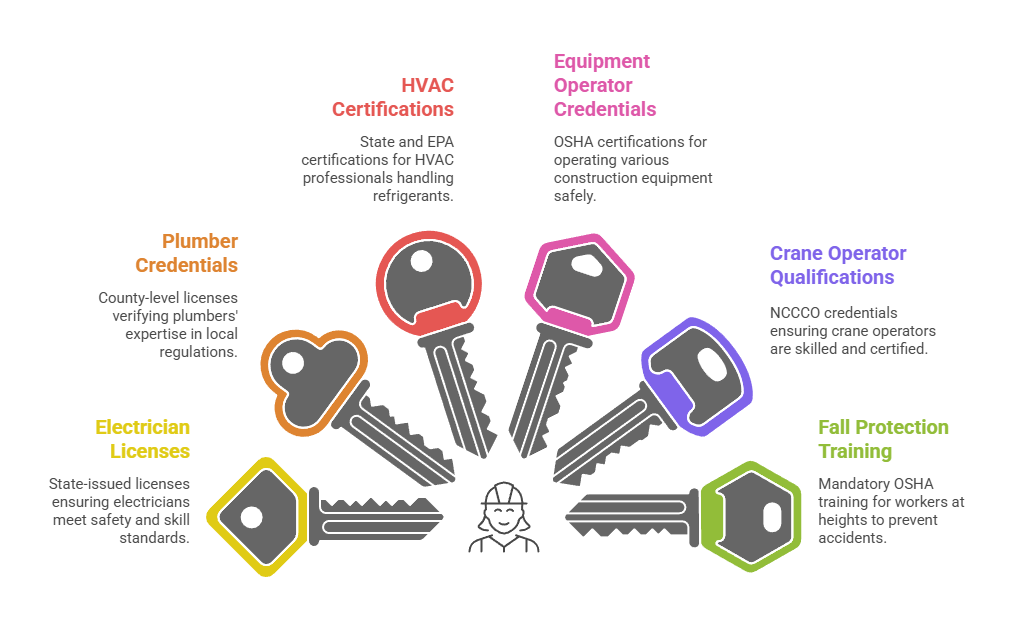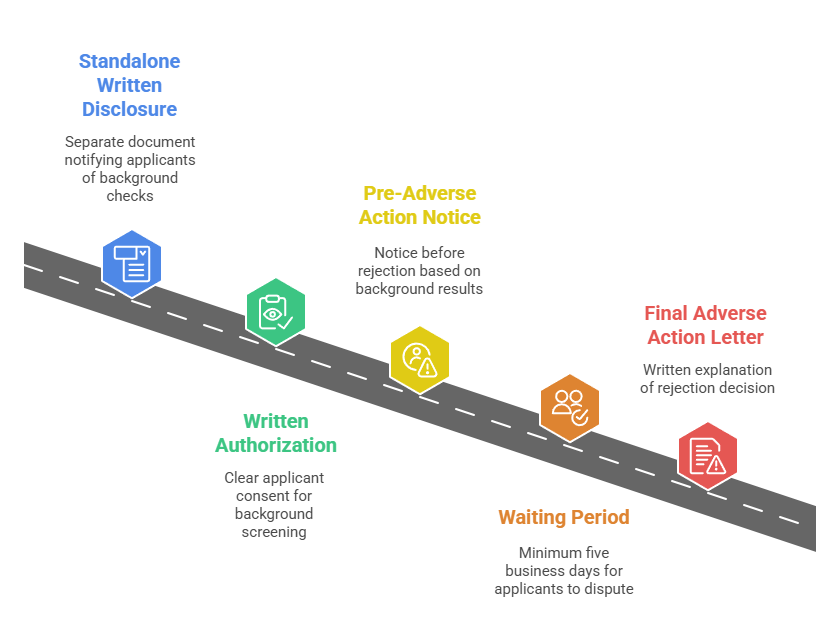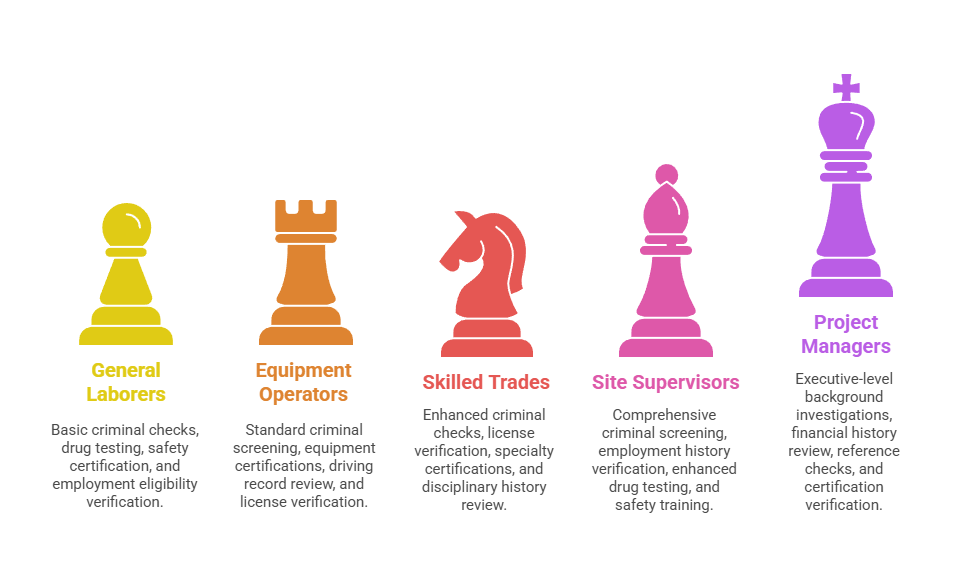Georgia's construction industry demands rigorous worker screening protocols that balance regulatory compliance with the speed required in one of the nation's fastest-growing construction markets. Understanding Georgia's unique combination of state licensing requirements, Right to Work laws, and federal safety mandates enables construction companies to build compliant screening programs that protect job sites while maintaining competitive hiring timelines in Atlanta's booming development landscape.
Key Takeaways
- Georgia construction worker screening processes must comply with state-specific licensing requirements, federal OSHA standards, and FCRA regulations while respecting the state's Right to Work protections that limit pre-employment inquiries.
- Criminal background checks through the Georgia Crime Information Center (GCIC) typically process within 24-72 hours, significantly faster than multi-state searches that can take 5-7 business days.
- Construction companies hiring for Georgia DOT projects must conduct enhanced background screening that includes driving records, drug testing, and specific disqualifying offenses outlined in federal transportation regulations.
- Drug screening remains the most common pre-employment test in Georgia construction, with 89% of contractors requiring panel tests that detect marijuana despite changing state attitudes toward cannabis use.
- License verification for skilled trades (electricians, plumbers, HVAC technicians) is mandatory in Georgia and should occur before extending job offers, as unlicensed work can result in project shutdowns and contractor penalties.
- Continuous monitoring programs provide real-time criminal record updates for existing employees, helping construction firms maintain site safety and satisfy insurance requirements for large commercial projects.
- The Georgia construction screening process typically requires 3-5 business days for comprehensive checks, though expedited services can deliver results within 24 hours for time-sensitive projects.
- Construction companies must maintain screening records for at least three years under FCRA requirements and seven years for federal contractor projects, with proper adverse action documentation for all rejected candidates.
Understanding Georgia's Construction Industry Landscape
Georgia's construction sector has experienced unprecedented expansion, with metro Atlanta consistently ranking among America's top five construction markets since 2022. The state's $28 billion construction industry employs over 245,000 workers across residential, commercial, and infrastructure projects. This explosive growth—fueled by corporate relocations, film production infrastructure, and hurricane recovery initiatives—has intensified the need for efficient Georgia construction worker screening processes that don't bottleneck project timelines.
The combination of rapid workforce expansion and high-stakes safety requirements makes background screening non-negotiable. Construction site accidents cost Georgia employers $487 million annually in workers' compensation claims. Studies show that comprehensive pre-employment screening reduces workplace incidents by up to 36%, making it both a legal necessity and a competitive advantage.
Georgia's Regulatory Framework
Georgia operates under a hybrid regulatory model that combines state-level licensing oversight with county-specific permitting requirements. The Georgia State Licensing Board for Residential and General Contractors establishes minimum standards. Individual municipalities often impose additional screening criteria, particularly for projects involving government contracts or public infrastructure.
The state's Right to Work status creates unique considerations for Georgia construction licensing background requirements. Georgia employers have broader discretion in hiring decisions but face stricter documentation requirements under FCRA guidelines. Construction firms must carefully balance their need for comprehensive screening against applicants' rights, ensuring all background check processes comply with ban-the-box legislation affecting public construction projects.
Essential Components of Georgia Construction Worker Screening
Georgia construction companies must implement multi-layered screening that addresses criminal history, substance abuse risks, and professional qualifications. Each component serves distinct purposes while contributing to comprehensive risk management. The screening depth varies based on project type, worker classification, and contractual requirements.
Criminal Background Checks and State Requirements
Criminal background screening forms the foundation of any Georgia construction worker screening process. Standard checks query the Georgia Crime Information Center (GCIC) database, which consolidates records from all 159 counties plus municipal courts. For construction positions, employers typically conduct seven-year criminal history searches covering felonies, misdemeanors, and pending charges—the maximum lookback period permitted under FCRA guidelines for non-executive positions.
Georgia construction companies must understand which offenses constitute automatic disqualifiers versus those requiring individualized assessment. Construction contractor background check policies should document clear decision matrices that withstand legal scrutiny while protecting worksite safety. Multi-state screening becomes necessary when hiring workers who recently relocated or when projects span state lines, extending turnaround times to 5-7 business days but providing critical risk mitigation.
Drug Testing Protocols
Drug screening represents the most consistently applied component of construction safety background screening in Georgia. Federal contractor projects mandate five-panel or ten-panel drug tests detecting marijuana, cocaine, amphetamines, opiates, and PCP. Despite Georgia's restrictive medical marijuana program, cannabis remains a disqualifying substance for most construction positions due to federal scheduling and workplace safety concerns.
Georgia construction companies increasingly implement random and post-accident testing programs beyond pre-employment screens. OSHA regulations require drug testing following serious workplace incidents. Many commercial insurance policies mandate random testing for operators of heavy machinery and vehicles, making comprehensive substance abuse policies essential for maintaining coverage and safety standards.
License and Certification Verification Requirements

Professional credentials verification prevents unlicensed workers from jeopardizing project compliance and company liability. Georgia maintains stringent licensing requirements for specialized construction trades. Automated verification systems can track expiration dates and disciplinary actions throughout employment tenure.
Key verification requirements include:

- Electrician Licenses: State licenses issued through the Georgia Construction Industry Licensing Board, with classifications ranging from residential to unrestricted commercial that must be current at project start
- Plumber Credentials: County-level licensing where Atlanta, Savannah, and Columbus each maintain separate registries requiring direct verification with issuing authorities
- HVAC Certifications: State business licenses plus EPA Section 608 certification for refrigerant handling, both of which require periodic renewal verification
- Equipment Operator Credentials: OSHA certifications for forklifts, scissor lifts, and aerial platforms specific to equipment types used on job sites
- Crane Operator Qualifications: National Commission for the Certification of Crane Operators (NCCCO) credentials with specialty endorsements matching equipment classifications
- Fall Protection Training: Mandatory OSHA certification for any construction work above six feet, with refresher courses required every two years
Construction project managers should directly query issuing authorities rather than relying on applicant-provided documentation. License fraud remains a persistent problem, with Georgia reporting over 200 cases annually of workers presenting expired or fabricated credentials.
Federal Contractor Requirements
Construction companies pursuing federal contracts face enhanced screening obligations that exceed standard commercial construction requirements. The Federal Acquisition Regulation (FAR) mandates comprehensive background investigations for workers accessing federal facilities or handling sensitive project information. E-Verify participation becomes mandatory for contractors and subcontractors of any size, requiring employment eligibility verification within three business days of hire.
Georgia DOT Background Check Standards
DOT construction projects require Commercial Driver's License (CDL) verification plus three-year driving record checks through the Georgia Department of Driver Services. Convictions for driving under the influence within seven years automatically disqualify applicants from positions involving vehicle operation. Multiple moving violations trigger additional scrutiny, and license suspensions require detailed review of circumstances and reinstatement documentation before employment approval.
Timing and Turnaround Considerations
Understanding realistic turnaround expectations for the Georgia construction worker screening process enables better project planning and hiring coordination. Timing varies significantly based on screening components, jurisdictional factors, and service level selection. Construction companies must balance thoroughness against operational needs for rapid workforce deployment.
| Screening Component | Standard Timeline | Expedited Timeline |
| GCIC Criminal Check | 24-72 hours | 12-24 hours |
| County Court Search | 1-2 days (metro) / 3-5 days (rural) | 24-48 hours |
| Drug Screen (lab confirmed) | 2-3 business days | 24 hours |
| License Verification | 1-2 business days | Same day |
| Multi-State Background Check | 5-7 business days | 3-4 business days |
| Employment History | 3-5 business days | Not typically expedited |
Expedited screening services compress these timelines for time-sensitive construction projects, with premium providers delivering results within 24 hours. These accelerated services cost 40-60% more than standard processing. Atlanta's major construction firms increasingly use expedited screening as standard practice, recognizing that the premium pays for itself through faster crew deployment.
Managing Delays and Incomplete Results
Even well-designed screening programs encounter delays that impact construction hiring timelines. Common name issues generate false matches requiring additional verification—a challenge in Georgia's diverse workforce. County court systems experiencing backlogs following the COVID-19 pandemic still show processing delays in certain jurisdictions.
Construction project managers should establish clear protocols for handling incomplete screening results. Many Georgia contractors use conditional job offers allowing workers to begin employment pending final background check clearance—particularly for lower-risk positions with adequate supervision. This approach requires careful FCRA compliance, including proper disclosure that continued employment depends on satisfactory screening results.
Legal Compliance and Risk Management
The Fair Credit Reporting Act governs all background screening activities, with strict requirements that construction companies must follow regardless of industry-specific pressures. FCRA compliance failures expose construction firms to statutory damages of $100-1,000 per violation, plus actual damages and attorney fees. Georgia construction companies must implement documented compliance procedures covering disclosure, authorization, and adverse action protocols.
FCRA compliance requirements include:

- Standalone Written Disclosure: Separate document notifying applicants that background checks will be conducted, not buried in employment applications or onboarding packets
- Written Authorization: Clear applicant consent specifically for background screening purposes, with unambiguous language about information types collected
- Pre-Adverse Action Notice: Required before rejecting applicants based on background results, including copy of report and Summary of Rights under FCRA
- Waiting Period: Minimum five business days allowing applicants to dispute inaccuracies before final employment decisions
- Final Adverse Action Letter: Written explanation of rejection decision with contact information for screening company and dispute rights
Georgia construction firms using third-party screening vendors must verify those providers maintain proper FCRA compliance. Construction companies remain legally responsible for screening violations even when using external services. Contracts should specify liability allocation and require screening companies to maintain appropriate errors and omissions insurance.
Ban-the-Box Considerations
Georgia's nuanced approach to ban-the-box legislation creates compliance complexity for construction employers. While private employers face no state-level restrictions on criminal history inquiries, Georgia's public sector follows Executive Order limiting when criminal background questions appear in government hiring. Construction companies pursuing public contracts must adjust screening protocols accordingly.
EEOC guidance strongly encourages individualized assessment of criminal records rather than blanket exclusion policies. Construction contractor background check policies should evaluate the nature of offenses, time elapsed since conviction, and relevance to specific job duties. Documenting these individualized assessments provides essential litigation protection against discrimination challenges under Title VII.
Industry-Specific Safety and Insurance Considerations
Construction safety background screening extends beyond criminal history to encompass safety training verification and incident history review. OSHA's Focus Four initiative targeting falls, electrocution, struck-by hazards, and caught-in/between dangers makes safety credential verification essential. Employers should confirm OSHA 10-hour or 30-hour training completion appropriate to worker classification.
| Insurance Type | Screening Requirements | Compliance Impact |
| General Liability | Criminal checks, drug testing | Policy condition; non-compliance voids coverage |
| Workers' Compensation | Safety training verification, drug testing | Affects EMR rates and premium calculations |
| Contractors' Pollution Liability | Environmental safety credentials | Required for demolition and excavation work |
| Professional Liability | License verification, disciplinary history | Mandatory for skilled trades coverage |
| Cyber Liability | Background checks covering financial crimes | Required when handling sensitive project data |
Commercial insurance carriers increasingly mandate specific background screening requirements as policy conditions. Insurance-driven screening requirements intensify for high-value commercial projects in Atlanta's major developments. These comprehensive programs may include continuous criminal monitoring, quarterly drug testing, and annual license re-verification beyond standard pre-employment checks.
Workers' Compensation and Safety Performance
Workers' compensation experience modification rates (EMR) reflect the financial impact of effective screening. Construction companies with robust pre-employment screening and safety training demonstrate lower accident rates. In Georgia's competitive construction market where labor costs constitute 30-40% of project budgets, the differential between a 0.75 EMR and a 1.25 EMR can determine bid competitiveness and profitability.
Implementing Efficient Screening Programs
Construction's project-based nature creates screening challenges absent in stable-workforce industries. Construction companies must rapidly scale crews for new projects while maintaining consistent screening standards. Effective Georgia construction licensing background requirements implementation demands standardized workflows and clear role-based screening matrices.
Role-based screening ensures appropriate thoroughness while avoiding unnecessary delays:

- General Laborers: Basic criminal checks covering seven-year history, five-panel drug testing, OSHA 10-hour safety certification, and I-9 employment eligibility verification
- Equipment Operators: Standard criminal screening plus equipment-specific certifications, three-year driving record review, random drug testing enrollment, and operator license verification through issuing authorities
- Skilled Trades: Enhanced criminal background checks, state license verification, specialty certifications for trade discipline, and disciplinary history review with licensing boards
- Site Supervisors: Comprehensive criminal screening with management-level scrutiny, employment history verification covering three previous positions, enhanced drug testing protocols, and leadership safety training credentials
- Project Managers: Executive-level background investigations, financial history review, professional reference checks, and verification of project management certifications and construction management degrees
Technology platforms designed for high-volume construction hiring integrate applicant tracking systems with background screening services. Mobile-optimized systems allow applicants to complete disclosure forms from smartphones—critical for construction workers who may not access desktop computers regularly. Automated status tracking eliminates time-consuming manual follow-up.
Continuous Monitoring for Existing Workforce
Progressive Georgia construction companies extend screening beyond pre-employment checks to include continuous criminal monitoring of existing employees. These systems automatically notify employers when current workers face new criminal charges or convictions. Continuous monitoring proves particularly valuable for construction companies maintaining crews across multiple simultaneous projects.
The business case for continuous monitoring strengthens as project values increase. A single theft or safety incident can derail million-dollar construction projects. Real-time criminal record updates allow construction companies to immediately remove workers posing documented risks. Some commercial general contractors now require subcontractors to maintain continuous monitoring programs as subcontract conditions.
Conclusion
Georgia's construction worker screening process requires careful balance between thoroughness and speed in one of America's most dynamic construction markets. Successful screening programs integrate criminal background checks, drug testing, license verification, and safety credential review within streamlined workflows. Construction companies that invest in robust screening infrastructure position themselves as preferred contractors for premium projects. As Georgia's construction boom continues through 2025 and beyond, efficient screening processes will increasingly separate industry leaders from competitors struggling with safety incidents and compliance violations.
Frequently Asked Questions
How long does the Georgia construction worker screening process typically take?
Standard comprehensive screening requires 3-5 business days in Georgia. Expedited services can deliver results within 24 hours for an additional fee. Complex cases involving multi-state searches may extend to 7-10 business days.
What disqualifies someone from construction employment in Georgia?
Common disqualifiers include recent violent crime convictions, theft offenses, positive drug tests, and lack of required licenses. Federal contractor positions impose stricter requirements including specific DOT disqualifications. Employers must conduct individualized assessments rather than blanket exclusions.
Are Georgia construction companies required to conduct background checks?
Georgia law does not mandate background checks for private construction employment. However, practical requirements stem from insurance policies, client contracts, and liability risk management. Most commercial construction firms conduct pre-employment screening as standard practice.
How far back do Georgia construction background checks look?
FCRA regulations limit most employment background checks to seven years for non-executive positions. Certain serious offenses may appear beyond seven years. Federal contractor positions may require more extensive lookback periods depending on project security requirements.
Can construction workers with criminal records find employment in Georgia?
Yes—Georgia employers must conduct individualized assessments considering offense nature, time elapsed, and job relevance. Many construction companies successfully employ workers with criminal backgrounds in appropriate roles. EEOC guidance prohibits blanket exclusion policies.
What drug tests do Georgia construction companies use?
Five-panel and ten-panel urine drug tests remain most common, detecting marijuana, cocaine, amphetamines, opiates, and PCP. Oral fluid testing has grown in popularity for faster results. Federal contractor projects mandate specific DOT drug testing protocols with laboratory confirmation.
Do Georgia construction screening requirements differ for subcontractors?
General contractors increasingly require subcontractors to maintain equivalent screening standards, particularly on commercial projects. Subcontract agreements should clearly specify screening obligations, documentation requirements, and compliance verification procedures.
How much does construction worker screening cost in Georgia?
Basic pre-employment screening packages typically cost $30-75 per applicant. Comprehensive screening with multi-state searches and employment history checks ranges from $75-150. Continuous monitoring services add $5-15 per employee monthly.
Additional Resources
- Georgia State Licensing Board for Residential and General Contractors - License Verification
https://www.sos.ga.gov/plb/acrobat/board_rules/093.pdf - OSHA Construction Focus Four Hazards Training Resources
https://www.osha.gov/training/library/materials - Federal Trade Commission - Fair Credit Reporting Act Compliance Guide
https://www.ftc.gov/business-guidance/resources/using-consumer-reports-what-employers-need-know - EEOC Guidance on Use of Criminal History in Employment Decisions
https://www.eeoc.gov/laws/guidance/consideration-arrest-and-conviction-records-employment-decisions-under-title-vii - Georgia Department of Labor - E-Verify Requirements
https://dol.georgia.gov/e-verify - FMCSA Drug and Alcohol Testing Regulations for Commercial Drivers
https://www.fmcsa.dot.gov/regulations/drug-alcohol-testing
Still have questions?
Get in touch with our team today for a personalized demo and discover how our tailored volume pricing and packages can drive results for your business!
How useful was this page?*
Note: your comments are anonymous. We use them to improve the website. Do not include any personal details.
Visit our FCRA Compliance Tool or leave a message here if you need a response.
From the blog Explore the GCheck Content Hub

How Long Does a Background Check Take? A Complete 2025 Guide
13 Dec, 2023 • 14 min read
The Ultimate Background Check Guide
13 Dec, 2023 • 4 min read
The Ultimate Guide to Employment Background Checks
13 Dec, 2023 • 10 min readThe information provided in this article is for general informational and educational purposes only and should not be construed as legal advice or a substitute for consultation with qualified legal counsel. While we strive to ensure accuracy, employment screening laws and regulations—including but not limited to the Fair Credit Reporting Act (FCRA), Equal Employment Opportunity Commission (EEOC) guidelines, state and local ban-the-box laws, industry-specific requirements, and other applicable federal, state, and local statutes—are subject to frequent changes, varying interpretations, and jurisdiction-specific applications that may affect their implementation in your organization. Employers and screening decision-makers are solely responsible for ensuring their background check policies, procedures, and practices comply with all applicable laws and regulations relevant to their specific industry, location, and circumstances. We strongly recommend consulting with qualified employment law attorneys and compliance professionals before making hiring, tenant screening, or other decisions based on background check information.

